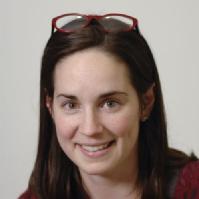WATE 2018 commendee: Rebecca Johnson (WMS)
Why did you start teaching? What (or who) inspired you?
I started teaching to share insight about the practicalities of applied health research. I felt there was a lot of structured and formal educational material, but I wanted to provide a ‘boots on the ground’ perspective to combine with their formal education.
What pearls of wisdom have you been given over the years that have helped you with your teaching?
Get to know your students; take time to listen; read the audience and respond to their needs during a lecture. I’m teaching postgraduate students more than what to learn, I am teaching them how to learn so they can become future innovators.
Is there anything you wish someone had told you when you started out?
About teaching, there really isn’t. I had a great foundation to start from with lots of support and I had opportunities to teach creatively which helped me gain confidence in my ability as a teacher.
If you were mentoring a first-time teacher, what three bits of advice would you give?
Listen to your students. Slow down. Focus on three or fewer concepts to teach in a given session (this will minimise the risk of students being overwhelmed eg ‘death by powerpoint’).
What advice/top tips would you give to more experienced teachers?
It would be the same advice! Listen to your students. Follow their lead. Take time to read in to their needs and challenge them, where appropriate, to build their confidence in their ability to think critically.
What new technologies are you currently using to enhance your teaching? What are your top tips for using them?
I don’t know that these are new technologies, but I enjoy teaching students using frequent breakout session activities to move away from the ‘sit and listen’ approach, and get them up and thinking for themselves. I am beginning to explore digital technology in teaching, but the jury is still out. I suppose my tip would be to use new technologies if they are useful, but not for the sake of them being new.
What new or future teaching innovations are you looking forward to?
I have submitted an IATL application to use music as an analogy for teaching integration of qualitative and quantitative data in mixed methods. I am also developing an online module to teach knowledge translation in healthcare at an international level, using new digital technology to teach it. I am looking forward to the first cohort of students taking the module to reflect on our module design and the use of some of these exciting teaching methods.
What does winning a WATE award mean to you?
Recognition of my dedication to teaching. I work in an environment where it is hard to strike a balance between research and teaching, where teaching is often side-lined in the face of bringing in research funding, and for which there is little career related reward for the distinction between excellent and mediocre teaching. Winning WATE means an awful lot to me, because it recognises formally that excellent teaching is worthwhile and valued.
What do you enjoy the most about teaching? What’s the best part of your job?
My favourite aspect of teaching is seeing the illumination of understanding presented in a student’s face. Watching a student move through a struggle to understand, achieve that understanding and then developing a sense of independence with their thought is hugely satisfying.
What are the biggest challenges faced by teaching staff? How do you overcome these?
My biggest challenge is striking a balance between developing excellent teaching and time to advance my research career. As an early career researcher, this is particularly hard in today’s competitive research environment.
What lessons have you learned from your students?
That there is such variety in approaches to learning and understanding. My students teach me to think about things differently, to never get too settled on one way of doing things, and their questions and challenges within our classroom constantly keep me engaged, engaging and enlivening my own thoughts as well as reflecting this back to how we learn together.
If you could write a recipe for the perfect inspiring teacher, what ingredients would you need?
I don’t know about a recipe; I don’t think being an inspiring teaching can be formulaic – it needs to be responsive and flexible to the needs of the audience, and that will always be changing. Key ingredients, though might include the following:
- undistracted time dedicated to your students whilst you are with them,
- attention to the details of their needs, from their perspective,
- challenging ideas and assumptions (your students or your own)
- teaching in creative ways that enliven the classroom
- passion for the subject
- humour and humility
- approachability.
Enjoyed hearing from Rebecca? See the full list of 2018 winners and commendees and read other interviews.

